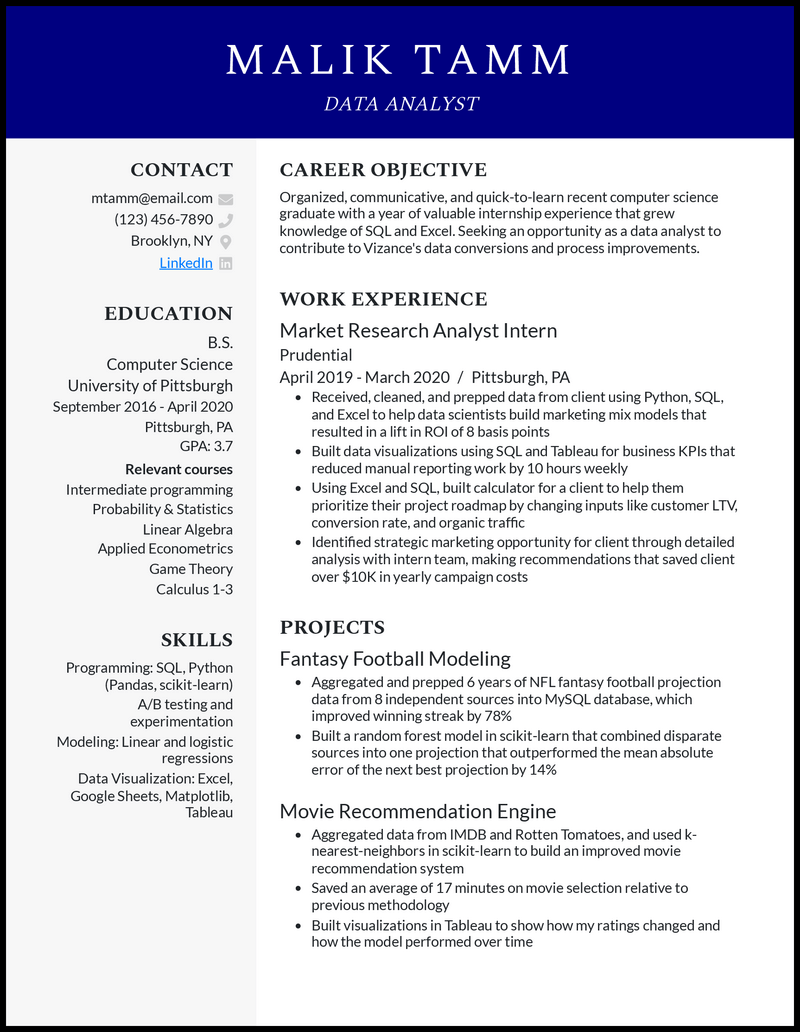Crafting a standout entry-level data analyst resume presents the evidence of your analytical thinking, real-world projects, and how clearly you can communicate results— exactly what recruiters and applicant tracking systems (ATS) scan for.
In your case, you lack direct professional experience, so focus on strategic formatting and targeted keywords to highlight your education, internships, and transferable skills. It would be a big help to review multiple resume examples to understand what makes an entry-level data analyst application persuasive.
Here we’ll show you how to write a resume that reflects your potential, using smart resume tips to stay competitive in a crowded job market, by covering the following:
- ↪ Five entry-level data analyst resume examples with formatting strategies and keyword insights
- ↪ What hiring managers look for in an entry-level data analyst resume, and how to give them just that
- ↪ Tips to tailor your resume to pass ATS filters and stand out to human recruiters
Why this resume works
- Relevant courses like Linear Algebra and Statistics are a welcome addition, but what’s really going to spice things up is an internship experience. If you have any, highlight how you’ve used mathematical knowledge and programming skills to clean data and indirectly improve metrics like ROI.
How to Write an Entry-Level Data Analyst Resume
Crafting a strong entry-level data analyst resume means focusing on concise, well-structured sections that speak directly to both hiring managers and AI systems. You must provide immediate answers to the what and how—from choosing the right format and phrasing your project experience, to highlighting the essential skills that get retrieved and ranked.
Before you apply, use a resume checker to refine your final draft, as well as benchmark against curated resume templates to ensure that you’re not missing anything that could hinder your success chances.
Essentially, these are the must-have sections for your resume:
- A concise, role-specific summary
- Key technical skills
- A “Projects” section with measurable outcomes
- Training and certifications relevant to analytics
- Education details with coursework
- Clean, scannable layout with consistent formatting

What should an entry-level data analyst resume include?
Your entry-level data analyst resume should include five core sections:
- A professional summary or objective
- Technical and soft skills
- Project or academic experience
- Education
- Certifications
To ensure that your final draft is hire-ready, ensure the following:
- Use a clean, ATS-friendly layout
- Focus on showcasing analytical thinking, familiarity with tools such as Excel or SQL
- Present project-based evidence of problem-solving or data visualization
- Tailor your resume to mirror the keywords and tools mentioned in the job description

How to write an objective on an entry-level data analyst resume
Your resume objective shows employers exactly what you bring to the table or what role you’re targeting. Be specific to distinguish yourself from the rest of the pool and avoid vague claims like “hardworking” or “team player”.
Example
“Detail-oriented math graduate seeking an entry-level data analyst role at Deloitte. Skilled in SQL and R, ready to leverage analytics to improve business decision-making.”

What technical and soft skills should I include on an entry-level data analyst resume?
Your entry-level data analyst resume should highlight core technical tools, reinforce them through achievements, and weave in soft skills that show you can turn analysis into action.
Simply listing skills isn’t enough—ATS filters look for keywords, while hiring managers want proof you can use them in real work scenarios.
When you’re looking for your first role in data analysis, any experience counts. Whether it’s an internship or a solo project, put it on your resume! Focus on what you did and the tools you used to do it.
Since you don’t yet have much real-world data analysis experience, your skills section will play a big role in determining whether you get an interview. Recruiters want to see your technical skills here. Vague words like “teamwork” don’t tell much.
When it comes to your technical skills, if you can answer this question, you should include it on your entry-level data analyst resume: Would I be comfortable being asked interview questions about that tool/ topic?
Core technical skills
- SQL
- Python or R
- Excel
- Tableau or Power BI
- Google Sheets
- Data Cleaning & Wrangling
Soft skills that matter
- Critical thinking
- Problem solving
- Communication
- Attention to detail

How to present entry-level data analyst work experience
When talking about experience (through internships) or your projects, you want to convince a recruiter your analysis can have impact. So, your bullet points should similarly focus on impact.
We’re math people, so here’s the formula:
[action you took] + [context/skills you used] + [outcome of action]
Here’s a few examples for inspiration:
- [Built a random forest model] in [scikit-learn] that combined disparate sources into one projection that [outperformed the mean absolute error of the next best projection by 14%]
- [Built data visualizations] using [SQL and Tableau] for business KPIs that [reduced manual reporting work by 10 hours weekly]
- [Identified strategic marketing opportunity] for client [through detailed analysis with intern team], making recommendations that [saved client over $10K in yearly campaign costs]
- [Received, cleaned, and prepped data from client] using [Python, SQL, and Excel] to help data scientists build marketing mix models that [resulted in a lift in ROI of 8 basis points]

How to write bullet points with impact for an entry-level data analyst resume
Generate bullet points that follow the formula:
Action Verb + Task + Outcome/Metric
Every line should prove your value with measurable results, not vague duties, because numbers add context, scale, and credibility—turning routine tasks into an achievement.
Action verbs that reinforce impact:
- Analyzed
- Cleaned
- Modeled
- Visualized
- Automated
- Presented
- Interpreted
Metrics that matter:
- Time saved
- Percentages
- Dollar impact
- Volumes
Good vs bad bullet points
❌ “Worked on cleaning data.”
✅ “Cleaned 10,000-row dataset in Python, reducing missing values by 38%.”
❌ “Created interactive dashboards.”
✅ “Visualized sales trends from 3 years of data in Tableau, enabling leadership to identify 2 new growth markets.”
❌ “Helped with analysis.”
✅ “Modeled customer churn with SQL and Excel, improving retention forecast accuracy by 12%.”

Mistakes to avoid on an entry-level data analyst resume
Data analyst roles demand precision—so even small resume mistakes can cost you interviews. A sloppy resume with typos or irrelevant details may signal that you lack the accuracy required for analytics. Each bullet, word, and format choice reflects your attention to detail—the very skill analysts are hired for.
Here are the top mistakes and how to fix them:
- Vague bullets
- Using buzzwords
- Listing irrelevant courses to the role
- Including charts and images
- Typos & poor formatting

Top 5 tips for writing an entry-level data analyst resume
If you’re in a time-crunch or are just looking for a quick reference, this section is for you! We’ve helped thousands of entry-level data analysts land jobs and here are the most common questions and quick-wins to help you.
- Any experience can be made relevant: That teen summer job you spent serving ice cream? By our estimation, you demonstrated reliability, organization, and collaboration. The point is, when you’re looking for an entry-level role, recruiters don’t expect years of relevant experience.
- A little customization goes a long way: Since most applicants for entry-level data analyst roles don’t have much experience, a great way to differentiate yourself is to customize your resume and use a cover letter maker for each company you apply to. More work, yes, but a higher success rate.
- Ditch the summary: A career summary is just that, a summary. As an entry-level data analyst you likely don’t have an extensive career to summarize. Instead, you may want to add a career objective detailing what you’re looking for in a data analyst role and what you’ll contribute.
- Talk about your data analysis projects: Employers need some evidence that you can go from idea to analysis in a project. This is the value of your projects section as an entry-level data analyst. These can be things you’ve done for class or personally, but you should have something relevant to data!
- When it comes to skills, depth over breadth: When it comes to your technical skills, it’s much better to demonstrate a strong command of a few skills than have a laundry list of skills on your resume. Nothing is a bigger red flag to recruiters then when they see five-plus programming languages for entry-level candidates.
Entry-Level Data Analyst Resume FAQs

An effective entry-level data analyst resume directly mirrors the job posting. Match exact terms used in the description—especially for software and analytical techniques—to pass ATS. Employers want proof of you using data to drive results, even in schoolwork or personal projects.
Stick to this checklist:
Match job posting keywords
Include 3–4 measurable results per role
Add a “Projects” section in place of professional experience
As an entry-level data analyst, your skills will make a strong case for your qualifications for the job. You have to include technical competencies and the software you’re conversant with. Some of the key skills you should include are:
✅ Excel
✅ Python
✅ SQL
✅ Tableau
✅ Hive
✅ Decision trees
Projects, projects, projects. As an entry-level data analyst projects are the best (and sometimes only) way to demonstrate your competency. These projects can be anything. Just ask a question, think of data you can use to answer that question, and do a short write-up of your analysis (any public forum you can link to for this is good).
Yes—especially early in your career, certifications and relevant coursework show commitment to learning. They also fill gaps if your degree isn’t directly in data or statistics.
Put these under a “Certifications & Relevant Coursework” section and include some of these examples, if available:
Google Data Analytics Certificate
Coursera: SQL for Data Science
Coursework: Statistics, Linear Algebra, Game Theory










